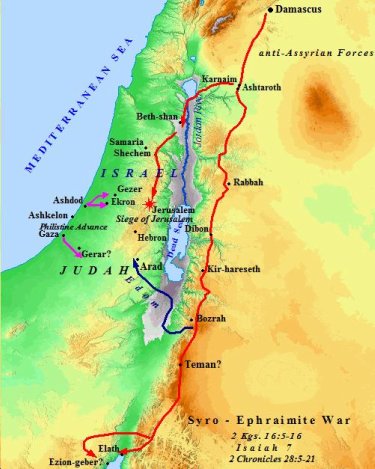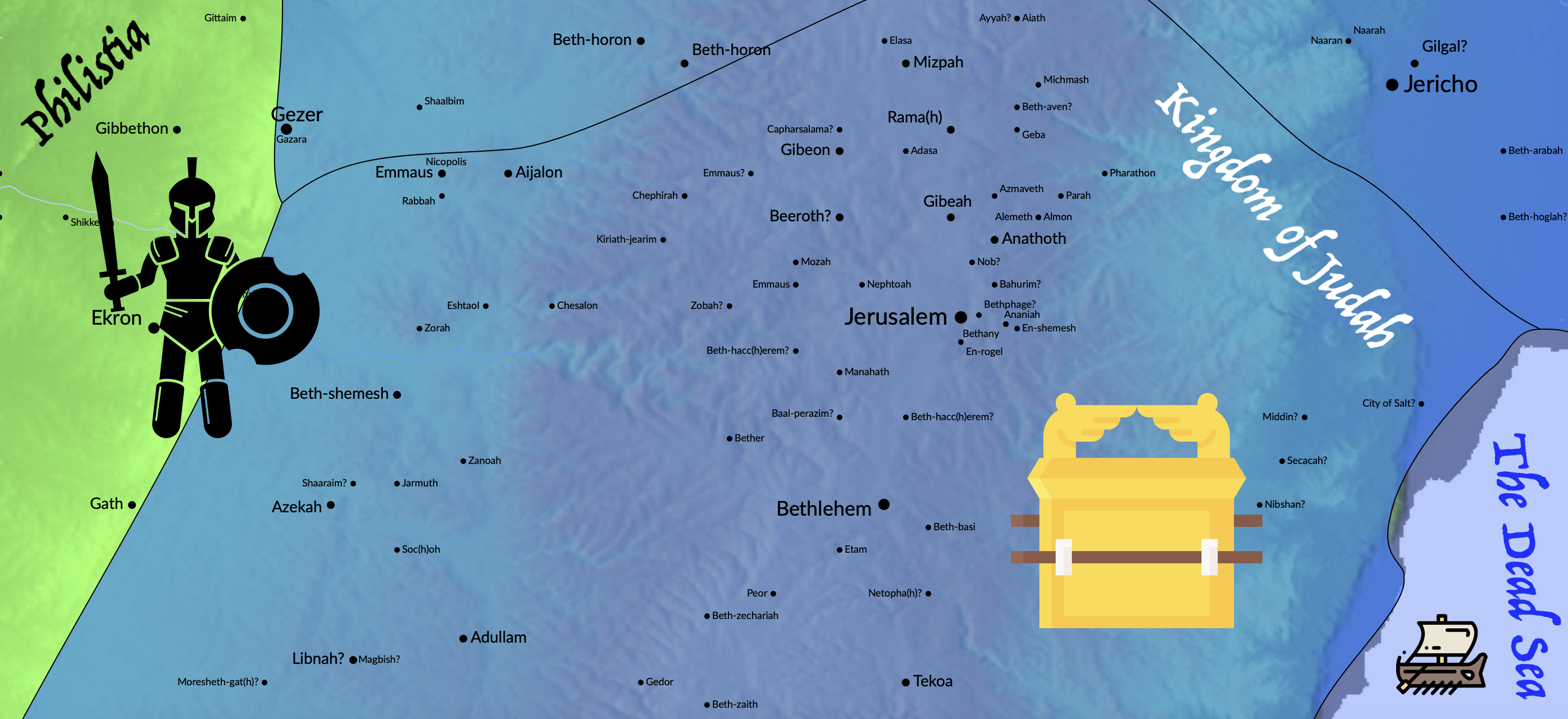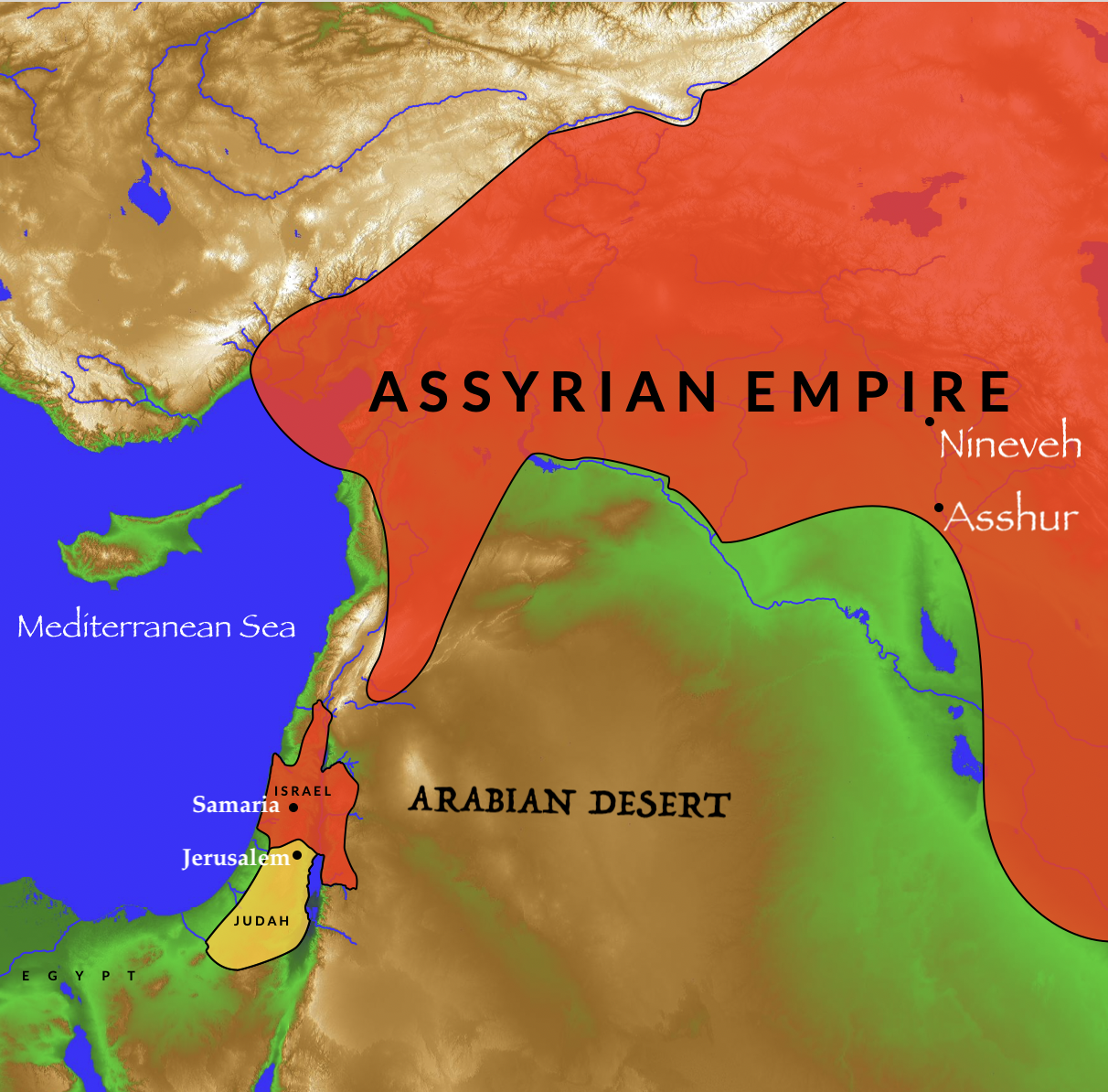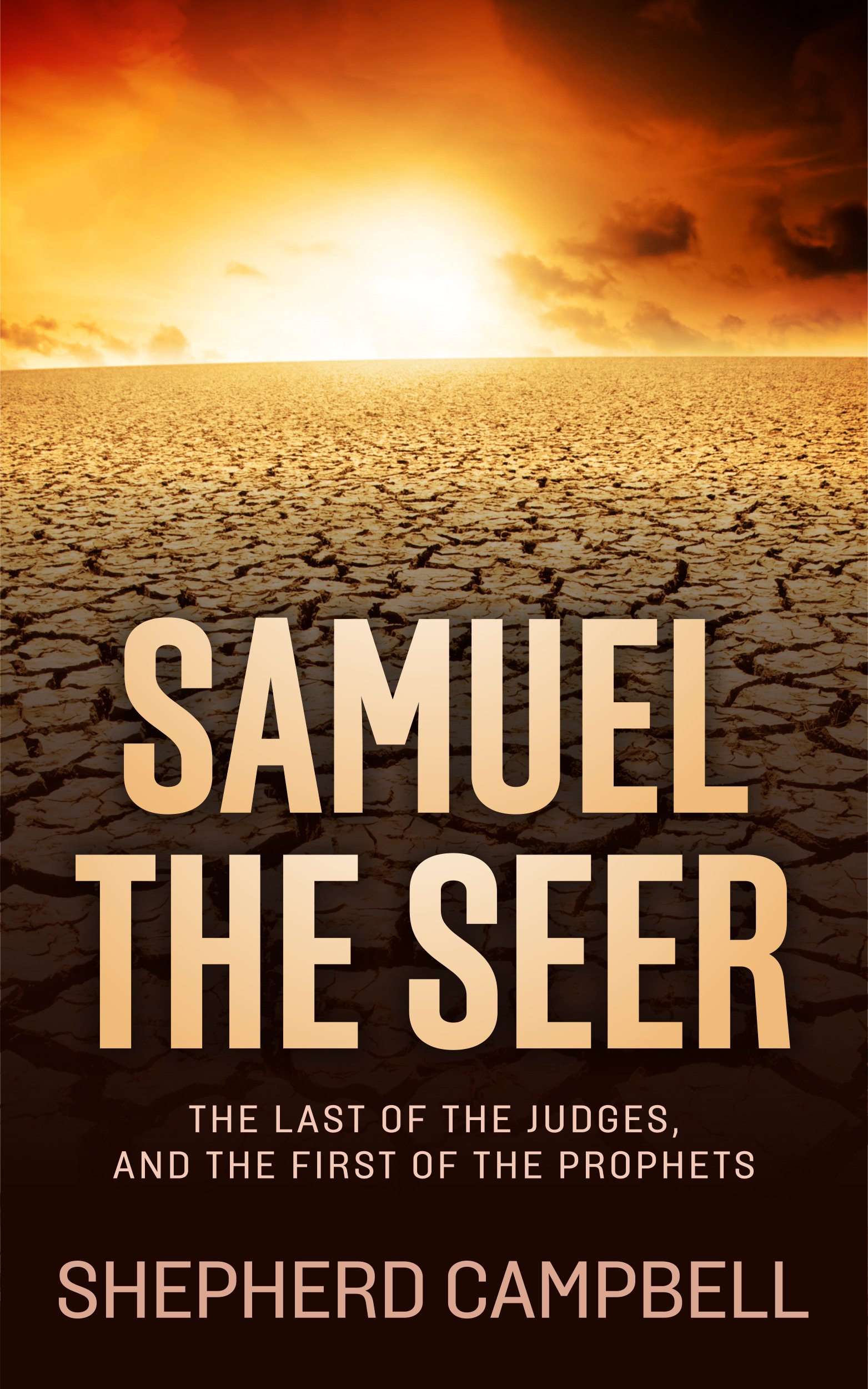- Biblical Maps
- Home Page
- History of Israel Blog
- Ancient Mesopotamia
- Map of Palestine
- Abraham
- Ancient Israel
- 12 Tribes of Israel
- Jerusalem
- The Book of Isaiah
- Palestine
- The Habiru
- Contact Us
- Bible Study Forums
- Media Page
- Visitors Sitemap
- Privacy Policy
- The History of the Old Testament
- In the Days of Noah
- The City of Jericho
VISIT OUR FACEBOOK PAGE!
The Prophet Isaiah - Isaiah 8
Length: The prophet Isaiah wrote Isaiah 8 in 22 verses.
Date: The prophet Isaiah is believed by many to have written chapter 8 around 734-732 BC. The reason being elements of Isaiah 8 clearly take place during the Syro-Ephraimite War. This places the writing ca 734-732 BC, just like the dating of Isaiah 7. Verses 3-4 indicate the demise of Samaria, which took place in 732 BC. Following this line of thought, one can place the time of writing ca. 734-733 BC.
Structure: Isaiah 8 begins a new message from the prophet Isaiah to Judah. Though closely related to chapter 7, chapter 8 contains multiple prophecies and a variety of different elements, including a progressive prophecy (Is. 8:8,10) concerning the prophesied child Immanuel from Isaiah 7:14. Isaiah 8 also contains a second child, the son of the prophet himself. Chapter 8 deals with more diverse topics and elements than chapter 7, though the unbelief and lack of faith on the part of Judah remains consistent, and the primary cause of God's displeasure as voiced through Isaiah. Isaiah 8:3-4 contains a prophecy about Judah's two enemies Damascus and Samaria, or Israel. These were the two nations aligned against Judah in the Syro-Ephraimite War.
THE PROPHET ISAIAH
Isaiah 8
Verse 1
vs. 3-4
vs. 5-7
Assyrian Timeline
v. 8
ISAIAH 8:1
"Then the Lord said to me, 'Take for yourself a large tablet and write on it in ordinary letters: 'Swift is the booty, speedy is the prey."
The prophet Isaiah, as revealed in verse one, was one of the writing prophets. Two other notable writing prophets are Jeremiah and Habakkuk. In Habakkuk 2:2 God tells the prophet to "record the vision and inscribe it on tablets". These prophets left writings behind of their prophecies, thoughts, and experiences. These writings were compiled into the "books" of Isaiah, Jeremiah and Habakkuk.
They are distinguished from other prophets who were not writers, meaning they did not leave any written material behind. Two of the most notable of these are Elijah and Elisha. Their words and deeds are recorded by others. They themselves, however, left nothing behind in the form of writing.
The prophet Isaiah records how God instructed him to take a large tablet, not just an ordinary sized tablet. Various interpretations exist as to what Isaiah was writing on. The NIV is least likely correct as it translates scroll. Interestingly enough the King James Version uses the phrase "take thee a great roll". The Septuagint (LXX) translates as "Take to thyself a volume of a great new book".
This word translated 'tablet' in the NASB stems from a word that means mirror, so Gary Smith indicates it was likely a "polished surface of stone or metal" (Smith, p. 221). Other translations use papyrus, which was what was used in ancient Egypt to write messages.
Regardless of the material used, God leaves no detail unspecified as He instructs Isaiah to "write on it in ordinary letters". This is a strange request from the Lord. Various versions have translated this phrase differently. Below is a list of versions with the translation it uses.
NASB: "ordinary letters"
NIV: "ordinary pen"
KJV: "man's pen"
LXX: "man's pen"
Indeed, the Hebrew word used is Cheret (Kheh-ret). It means; to engrave, a chisel, graver, a style of writing, graving tool, pen. Interestingly enough it is used only twice in the entire OT - here in Isaiah 8:1 and in Exodus 32:4, where it appears as the tool Aaron used to engrave the golden calf while Moses was on Mt. Sinai.
The implication seems to be God wanted Isaiah to write in the style of man, or in a common script, which could easily be read and understood by the humblest of Hebrews (Gray, Isaiah 1-27, 143). As his audience was Judah, the language he used was Hebrew. This also speaks to the personal nature of God. He seeks and pursues, continually, a personal relationship with His people.
The great Scottish theologian Robert Jamieson notes that the object "was that, after the event, all might see that it had been predicted by Isaiah" (Bible Commentary Volume I, 1861-5, p. 428). By writing the message in a format everybody could read, Isaiah would be reaching the largest possible audience with God's Words - both in the immediate present and in the future.
In the OT this relationship was expressed through His prophets - such as with the prophet Isaiah. They were His mouthpiece to His people. And yet He repeatedly appeared in a more personal nature to many of His servants as well.
In the NT this relationship was manifested in Jesus Christ and His relationship with His disciples. Much of Christ's power lie in His ability to connect personally to people He encountered, creating that personal relationship immediately, such as He did with the Samarian woman at the well (John 4:7).
Isaiah's message, intended by God for all of His people to read it and understand, was; "Swift is the booty, speedy is the prey." This cryptic message has also been interpreted in various ways. The NIV uses the Hebrew phrase, which is also the name of Isaiah's second son we learn about in Scripture (see Isaiah 7), 'Maher-Shalal-Hash-Baz'. This phrase translates in the NIV as, 'Quick to the plunder, swift to the spoil'.
The King James Version interprets this Hebrew phrase slightly different;'making speed to the spoil, he hasteneth the prey'. The Septuagint translates this phrase in the following; 'making a rapid plunder of spoils, for it is near at hand'. The 1599 Geneva Bible offers; 'Make speed to the spoil: haste to the prey'.
Gary Smith points out this construct uses two parallel imperative verbs; quick and swift, plus two parallel words for booty in spoil and plunder. Thus the prophecy could be read; "hurry spoil, be swift plunder" (Smith, p222). The prophecy becomes clearer when read in context with the below verses.
ISAIAH 8:3-4
" 3 So I approached the prophetess, and she conceived and gave birth to a son. Then the Lord said to me, 'Name him Maher-shalal-hash-baz; 4 for before the boy knows how to cry out 'My father' or 'My mother', the wealth of Damascus and the spoil of Samaria will be carried away before the king of Assyria.' "
There is division amongst scholars as to whether this child is the same as the child mentioned in Isaiah 7:14-16. Despite the similarities of each prophecy, Is. 8:3-4 seems to speak of a different child - this one apparently identified as the prophet Isaiah's own child (Zodhiates, p. 906).This would parallel the construct in Isaiah 7, as first Isaiah's child Shear-jashub was mentioned in that prophecy, then followed by the child named Immanuel. The same structure is seen in Isaiah 8.
The first half of Isaiah 8:3 depicts the prophet "approaching" the prophetess, most likely his wife, and she then conceives. The encounter is obviously one between a husband and wife, though it is not clear if Isaiah's wife. This fact seemingly eliminates the possibility this child could be the same one prophecied about in Isaiah 7:14. Rather, this is Isaiah's second child, and the brother to Shear-jashub. The parentage of the child in Isaiah 7:14-16 is not specified, and in Isaiah 7:14 it is the mother naming the child Immanuel. Whereas in Isaiah 8:3, the prophet Isaiah is told to name the child.
Jamieson suggests the virgin of Isaiah 7 may be the same as the prophetess in Isaiah 8. This would suggest the virgin married in the interim between Isaiah 7 and 8, becoming Isaiah's second wife (not taboo in the Old Testament). Jamieson also points out this would make the child Immanuel in Is. 7:14 different from Maher-shalal-hash-baz.
Thus, according to Jamieson, 19 months have passed since the prophecy in Isaiah 7:14 to Isaiah 8:3 - 9 months before the birth of Immanuel (Is. 7:14); and 10 months from that time to the birth of Maher-shalal-hash-baz. Add an additional 11 or 12 months from Isaiah 8:3, the time required before the child could cry "Father", and one has an approximate time frame of 3 years over which these prophecies (Jamieson, p. 428) are taking place.
The prophecy of Immanuel in Isaiah 7 will surface again in Isaiah 8:8,10; and then again in Isaiah 9. Thus this progressive prophecy becomes more understandable as more is revealed of Immanuel's identity. However, the child spoken of in Isaiah 8:3-4 is a different child. This child is Isaiah's second child mentioned in as many chapters (see Is. 7:3). And before he can speak, thus within 1 1/2 to 2 years, Damascus and Israel will fall. This is the prophecy of Isaiah 8:3-4.
Verse 4 connects this prophecy with the message in verse one. The booty of verse one speaks of Damascus and Israel; and the prey refers to Assyria. At the time of the prophecy, these two nations were pressuring Ahaz of Judah into
joining them in an alliance against Assyria. Aram-Damascus and Israel
had gathered their forces together, with plans to plunder Judah and take Judah's spoils to use against Assyria. They intended to force Judah's hand, whether by political alliance or by way of war would depend on Judah's King Ahaz. Isaiah urged the king of Judah to trust in God, rather than the strength of these other two nations.
The prophet Isaiah warns Ahaz that to seek the assistance of Assyria is to hasteneth the prey. In
other words, while Damascus and Israel seek to plunder Judah, the predator
Assyria will hasten to devour all three. Isaiah warns King Ahaz that by
seeking the help of Assyria over God, he will suffer the consequences of
his decision by ushering in his own demise and the fall of the Davidic
Throne in Judah to the mighty Assyrian empire.
It is important to know history teaches us Damascus and Samaria fell to Assyria in 732 BC. The Northern Kingdom of Israel was raided and looted several times before disappearing to the Assyrians in 722/21 BC. Thus it is likely this prophecy in verses 3-4 was given to Isaiah by God sometime prior to 732 BC, and after the beginning of the Syro-Ephraimite War. A likely date of 734-733 BC is safe to assume.
The prophet Isaiah informs Ahaz should the king listen to Yahweh, then before Isaiah's own newborn child can speak a word these two nations of Aram-Damascus and Israel will be toppled and their wealth carried away. As stated above, this signified a time period of 1 1/2 - 2 years from the time Isaiah spoke the prophecy - or however long it would take his newborn child to speak.
The significance of this is lost on us today as we simply do not appreciate the fact Isaiah predicted the fall of Damascus and Israel to King Ahaz of Judah at a time when that seemed most unlikely. Damascus and Israel were threatening Judah from a position of strength.
The two nations clamored to wage war against Assyria - the world empire of the time. Thus these two nations obviously were proud of their own strength; and not afraid to flex their collective muscles to the smaller nations in the area like Judah. So for the prophet Isaiah to predict the fall of Damascus and Israel went against the situation at hand.
ISAIAH 8:5-7
" 5 And again the Lord spoke to me further, saying, 6 "Inasmuch as these people have rejected the gently flowing waters of Shiloah, and rejoice in the Rezin and the son of Remaliah; 7 Now therefore, behold, the Lord is about to bring on them the strong and abundant waters of the Euphrates, even the King of Assyria and all his glory; and it will rise up over all its channels and go over all its banks."
Based on verse 6 it would seem King Ahaz had already given the prophet Isaiah his response. Ahaz, it would appear, had already appealed to Assyria for help against Damascus and Israel, despite Isaiah's words from verses 1-4.
One first notices the phrase, "These people..." - though who "these" are is not readily identifiable. Scholars differ as to whether this refers to the northern nation of Israel only, the southern nation of Judah only, or perhaps a remnant of those in Judah who wanted to join with Israel and Rezin against Assyria.
Debate remains as to exactly who is referred to by "these people". The text does not clearly identify who is meant. Isaiah 6:9 uses the same phrase and it clearly refers to the people of Judah. Robert Jamieson argued "these people" referred to both Israel and Judah. Israel was guilty in their alliance with Rezin. Judah was guilty in two ways: some desired to side with Rezin; whilst other factions favored alliance with Assyria. Neither nation choose to trust in God.
The sin of "these people" qualifies both Israel and Judah as capable of being identified as the intended recipient of this prophecy. Isaiah reveals that "these people" have rejected the gently flowing waters of Shiloah. The imagery of gently flowing waters is one of peace and ease, of safety and security. The waters of Shiloah originated with the Gihon Spring east of Jerusalem and flowed through the Kidron Valley.
This entire area is closely associated with YHWH and King David. The Gihon Spring is what Joab, one of David's Mighty Men, climbed through to enter Jebus and help over throw that city. David renamed it Jerusalem. In this sense, the waters of Shiloah are used by the prophet Isaiah as a metaphor for God.
These people have rejected God. As such, these people are both the Jews of Judah and Israel for both had rejected God. Verse six indicates the people instead chose the leaders of Damascus and Israel, identified as Rezin and the son of Remaliah.
II Kings 16:7, however, depicts Ahaz as pleading to the King of Assyria for assistance against Damascus and Israel.
"So Ahaz sent messengers to Tiglath-pileser king of Assyria saying, 'I am thy servant and thy son; come up, and save me out of the hand of the king of Syria, and out of the hand of the king of Israel, which rise up against me.' "
So rather than the gently flowing waters of Shiloah, Judah choose the "strong and abundant waters of the Euphrates" , or as II Kings 16 makes plain, the Assyrians. There was nothing gentle about the Assyrian war machine, and Judah was about to experience these strong and mighty waters.
Isaiah makes clear the consequences of disobeying God throughout the book of Isaiah. To reject God was to bring about the consequences of that rejection. The prophet made clear what those consequences were.
-- Isaiah 1:20 "But if you refuse and rebel, you will be devoured by the sword."
-- Isaiah 5:24 "...So their root will become like rot and their blossom blow away like dust..."
-- Isaiah 7:9 "...if you will not believe, you surely shall not last..."
-- Isaiah 30:12 - Because Judah trusted oppression (Aram) and guile (Israel), their "collapse comes suddenly in an instant".
What we see in verse 7 is the arrival of Assyria on the scene in Canaan. This would've occurred during the reign of Tiglath-pileser, king of Assyria. Based on biblical events, the year may have been ca. 734 BC. Ironically it was one of the region's own nations, Judah, that summoned Assyria. Consequently, Assyria focused her attention on the frontier land between Egypt and Mesopotamia. This would prove fatal to the region. Isaiah urged it was time to trust God - only He could stop Assyria.
THE ASSYRIAN TIMELINE
The Assyrian kings from Tiglath-pileser through Sennacherib (734 - 701 BC) ravaged the land of Canaan in numerous campaigns. II Chronicles 28:20 depicts Tiglath-pileser's treatment of king Ahaz of Judah. The image of an overflowing Euphrates River was fulfilled by the multiple invasions and campaigns by Assyria into Canaan. Tiglath-pileser himself initiated 3 campaigns into Israel and Canaan.
|
734 BC - Tiglath-pileser answers the call of King Ahaz of Judah and helps him in the fight against Damascus & Israel. |
733 BC- Tiglath-pileser outright attacks Israel, though does not conquer it. |
|
732 BC - Tiglath-pileser seizes Aram-Damascus. King Ahaz of Judah pays the Assyrian king tribute. (SEE II Chron. 28:19,28 and II Kgs 16:14) King Ahaz sent gold and treasure from Yahweh's Temple as tribute to the pagan king of Assyria. |
721 BC - Tiglath-pileser's successor, King Shalmanesar, begins the sacking of Samaria and destruction of Israel. Shalmanesar dies, thus Sargon finishes the job. Over 27,000 captives are deported from Samaria, the heartland of Israel. |
ISAIAH 8:8
SAMUEL the SEER
Now Available in Print & eBook on Amazon!!
POPULAR TOPICS
Learn more about these popular topics below. The Bible is full of fascinating stories, characters and mysteries!
BIBLE MAPS
Explore the land of the Old Testament! View these maps of the Bible.



